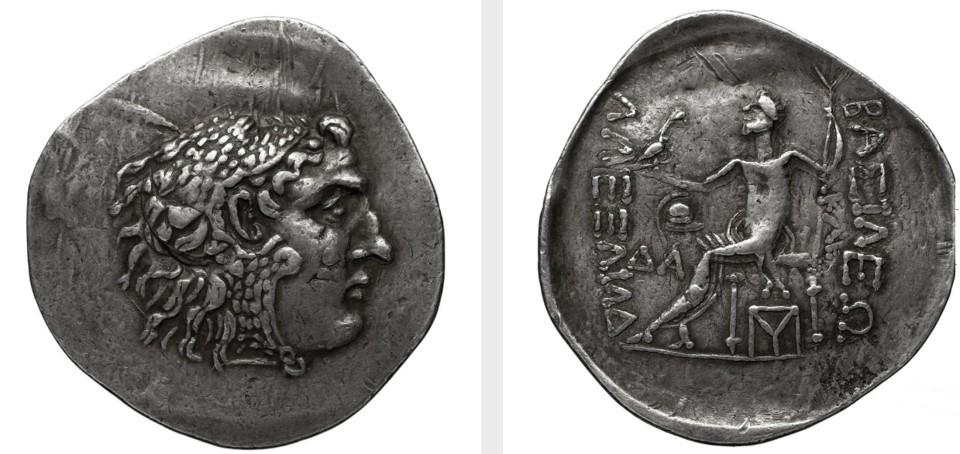90 BCE - 70 BCE | BAΣΙΛEΩ ΑΛΞΞΛIΛΔ (sic)
Overstriking coin
Mesembria 385 Paris.jpg
[1], [0]
Overstruck variety
Thasos tetradrachm.jpg
Description
| ObverseInscription or printing placed on the obverse.:
|
Head of Herakles right, wearing lion skin headdress.
|
ReverseInscription or printing placed on the reverse.:
|
BAΣΙΛEΩ ΑΛΞΞΛIΛΔ (sic) (Greek) Zeus enthroned left, holding eagle and scepter. Under throne, monogram (ΠΥ). In left field, Corinthian crested helmet and ΔΑ.
|
Mint and issuing power
| MintIdentifies the place of manufacture or issue of a numismatic object.:
|
Mesembria
|
Ancient regionAncient region.
|
Thrace
|
Modern countryModern country: Bulgaria
|
AuthorityIdentifies the issuing power. The authority can be "pretended" when the name or the portrait of X is on the coin but he/she was not the issuing power. It can also be "uncertain" when there is no mention of X on the coin but he/she was the issuing power according to the historical sources:
|
Alexander III the Great (Argead king, 336-323 BC)
|
Chronology
| FromIdentifies the initial date in a range assigned in a numismatic context. 90 BCE toIdentifies the final date in a range assigned in a numismatic context.. 70 BCE
|
hellenistic periodTime period of the numismatic object.
|
Physical description
MetalThe physical material (usually metal) from which an object is made.: Silver 
|
WeightWeight of the numismatic object (in grams). in grams: 16.8816.88 g <br />16,880 mg <br />
|
DenominationTerm indicating the value of a numismatic object. Examples: tetradrachm, chalkous, denarius.: tetradrachm 
|
AxisDescribes the directional relationship between the obverse and reverse of a numismatic object.: 1212 mm <br />1.2 cm <br />
|
| DiameterDescribes diameter of an object (in mm).: 4040 mm <br />4 cm <br />
|
StandardStandard.: Attic
|
References
| Coin referenceReference of the Coin:
|
Callataÿ 1987b, p. 242
|
Coin series referenceReference to coin series study:
|
Callataÿ 1987b1Callataÿ 1987b, p. 242, Price 19912Price 1991, n° 1101, Karayotov 19943Karayotov 1994, p. 93, n° 292 (O47-R132 monogram 43), Callataÿ 1994b4Callataÿ 1994b, p. 336, D31/R5a, Callataÿ 1997a5Callataÿ 1997a, p. 103, D31/R5a, Callataÿ 2021a6Callataÿ 2021a, p. 277, n° 22
|
| Coin series web referenceCoin series web references:
|
|
Description
| ObverseInscription or printing placed on the obverse.:
|
Head of Dionysos right, wearing ivy wreath
|
ReverseInscription or printing placed on the reverse.:
|
(HP)AKΛE(OYΣ ΣΩΤΗΡΟΣ ΘΑΣΙΩΝ) Herakles standing, nude, holding lion skin and club. In field, letter or monogram.
|
Mint and issuing power
| MintIdentifies the place of manufacture or issue of a numismatic object. ᵖ:
|
Thasos
|
Ancient regionAncient region. ᵖ
|
Thrace
|
Modern countryModern country: Greece
|
AuthorityIdentifies the authority in whose name (explicitly or implicitly) a numismatic object was issued. ᵖ:
|
|
Chronology
| FromIdentifies the initial date in a range assigned in a numismatic context. toIdentifies the final date in a range assigned in a numismatic context..
|
periodTime period of the numismatic object.
|
Physical description
| DenominationTerm indicating the value of a numismatic object. Examples: tetradrachm, chalkous, denarius. ᵖ:
|
tetradrachm 
|
StandardStandard. ᵖ:
|
Attic
|
References


